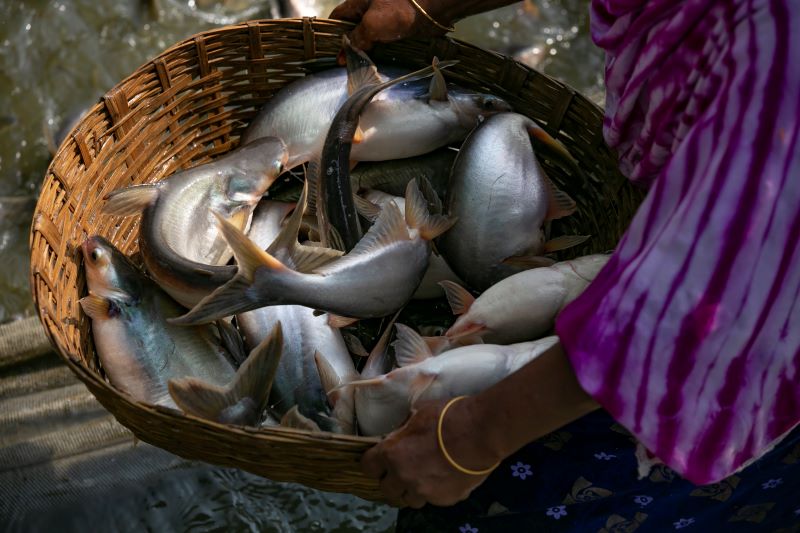
Food safety priorities for fish consumed in Bangladesh — which boasts over 12 million fish farmers and robust domestic demand — should focus on reducing levels of formalin, heavy metals and antibiotics and other growth promoters, according to a new paper from researchers with the Feed the Future Innovation Lab for Food Safety.
The team, led by Madan Dey, professor and chair of the Department of Agricultural Sciences at Texas State University, conducted a systematic review of published findings on adulteration of fish in Bangladesh. The studies included domestic, imported, wild-harvested and aquaculture-farmed fish. Their goal was to characterize the scope and magnitude of fish adulteration encountered by Bangladeshi consumers, providing a guide for policymakers and government regulators to strengthen the food safety of fish.
Among the most pressing concerns were formalin, which is sometimes added to fish to prevent spoilage and extend shelf life. Heavy metals, including chromium, arsenic, lead, iron, mercury and cobalt, were reported in fish and feed. In addition, antibiotics and growth promoters, used in aquaculture to increase yields, exceeded permitted levels in some cases.
“Are we saying that fish in Bangladesh are unsafe to eat? No, we are not,” said Dey. “A similar survey elsewhere in the world might find similar results. We are simply saying that given the socio-economic environment in Bangladesh and the potential health effects, we can do much better, right? These are the key problems that deserve a solution.”
The team’s paper, A systematic review of fish adulteration and contamination in Bangladesh: A way forward to food safety, was published in the February 16 issue of Reviews in Aquaculture. The researchers searched multiple databases and identified 37 studies of fish adulteration. Formalin, antibiotics and heavy metals were key categories of concern.
Dey noted that while heavy metals may enter the food chain passively — and inadvertently — through water sources or feed, producers or vendors may have financial incentives to use formalin and antibiotics. This raises questions Dey hopes economics can play a part in answering.
“What kind of policy could we have so that formalin is not being used or to dramatically reduce the use of antibiotics in fish production?” he asked. “How could we solve this in an economically viable way?”
Dey and the team are addressing these questions through a project with the Food Safety Innovation Lab, which aims to explore the economics of producing safer fish in small-scale aquaculture farms. Through experimental auctions, they have found that Bangladeshi consumers are willing to pay higher prices for fish with healthier attributes and less adulteration. Their current research is investigating the production side, to determine the cost for farmers to produce safer fish.
“In some cases, it might increase the cost of production, but it may be okay because safer fish can garner a 30-percent price premium,” said Dey. “And we can also say to producers: ‘You may not realize that you may be using some ingredients that are not necessary or healthy for consumers.’ With a 30% premium, can you produce fish to those standards? If safer feed does not cost more and gives you equal or more yield, then it is a win-win situation for everybody.”
Dey noted that the government and regulatory agencies that set food safety policies need assistance finding marketable solutions that conform to the country’s political, economic and institutional structure. To build on this work, the team is also working to raise awareness about the food safety risks of fish adulteration with producers and government agencies.
“We are developing training programs for fish farmers and other value chain actors based on our research,” said Md. Akhtaruzzaman Khan, professor in the Department of Agricultural Finance at BAU and the paper’s lead author. “We have a strong partnership with the Bangladesh Food Safety Authority, and we are planning to create a brief to advise them of our findings. The end goal of our project is to solve some of these problems in an economically viable way.”
Coauthors of the study include Md. Emran Hossain (BAU), Md. Sayemul Islam (BAU), Mohammad Saidur Rahman (BAU), and Pratheesh Omana Sudhakaran (Texas State University).
Amanda Garris is a communications specialist with the Feed the Future Innovation Lab for Food Safety.

